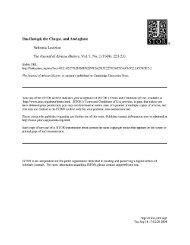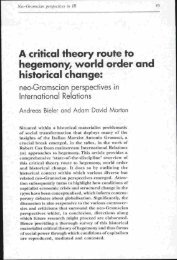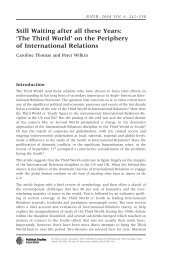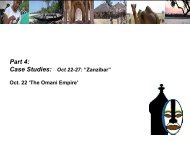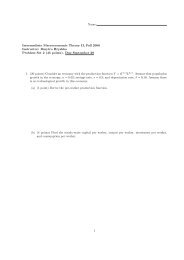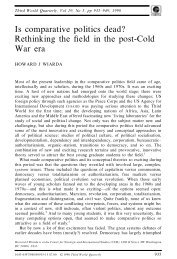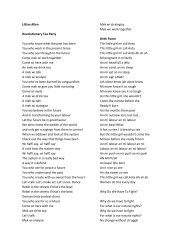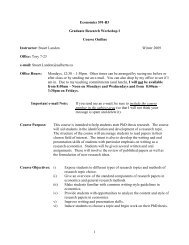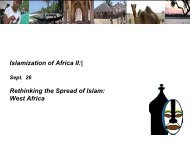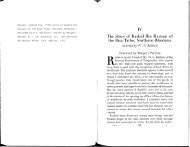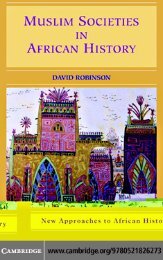personal memories revolutionary states and indian ocean migrations
personal memories revolutionary states and indian ocean migrations
personal memories revolutionary states and indian ocean migrations
You also want an ePaper? Increase the reach of your titles
YUMPU automatically turns print PDFs into web optimized ePapers that Google loves.
miraculous light that appears over the tombs of the Imams of Nizwa, a reference<br />
that places him squarely in the heart of Ibadi tradition. His reference to Nasir ibn<br />
Abi Nabhan is interesting but not surprising, given the account of his fearsome<br />
talisman against Sayyid Sa‘id <strong>and</strong> his uncle, Talib b. Ahmad, that led Sa‘id to keep<br />
Nasir by his side for the rest of his life, <strong>and</strong> hold Nasir’s head in his lap as he<br />
expired. 72 Even Abdallah Saleh Farsy, whose interest is mainly in Shafi‘i scholars,<br />
mentions that Nasir was said to deal with the jinn. 73 Nasir had died only forty-four<br />
years before; he had been an associate of Mundhiri’s father, <strong>and</strong> his reputation<br />
remained vivid. Such stories strongly affirm that the Muslims--<strong>and</strong> for Mundhiri,<br />
the true Muslims are only the Ibadis--are the true heirs of the baraka of Jesus as well<br />
as Muhammad, for they are able to perform miracles, whereas the Christians are<br />
not.<br />
In 1891, at the time that Mundhiri wrote his refutation of Kindi’s treatise,<br />
Zanzibar had become a British protectorate, ruled from the Colonial Office in<br />
London. Interactions with the British <strong>and</strong> with Christians had become inevitable for<br />
leading scholars of Zanzibar, though perhaps they were not yet particularly alarmed<br />
at potential European cultural <strong>and</strong> religious influence. This situation changed<br />
dramatically as the judicial system came under British control in the late 1890s, 74<br />
more Muslim children attended Christian schools, <strong>and</strong> some Muslims in Zanzibar<br />
were adopting European dress. In January 1910, the leading scholar in Oman, Nur<br />
al-Din ‘Abdallah ibn Humayyid al-Salimi, wrote a response to some Ibadis living in<br />
Zanzibar concerning the permissibility of attending Christian schools, wearing<br />
European clothes, learning European languages, <strong>and</strong> shaving the beard. To all of<br />
these questions Salimi gives a strongly worded <strong>and</strong> tightly argued prohibition. 75 In<br />
the section on schools, he draws on Irshad al-hayara fi tahdhir al-muslimin min madaris<br />
al-nasara, written in 1901 in Beirut by the Palestinian scholar, Yusuf b. Isma‘il al-<br />
Nabhani (1850-1932). 76 Nabhani in turn cites Tarbiyat al-mar’a, by the Egyptian,<br />
Muhammad Tal‘at Harb, who quotes a European magazine indicating that Christian<br />
schools in Muslim l<strong>and</strong>s, <strong>and</strong> especially schools for girls, were intended to promote<br />
disaffection from Islam <strong>and</strong> love for European imperial rule. 77 Only on the subject<br />
of learning foreign languages does Salimi grant a small concession: foreign<br />
languages may be learned only to the extent that is necessary by those who are<br />
forced to interact with foreigners. But he feared that if children learned foreign<br />
languages, their familiarity with Arabic would decrease, <strong>and</strong> they would become less<br />
influenced by the Qur’an <strong>and</strong> Sunna of the Prophet.<br />
CONCLUSION<br />
Christian missionaries enjoyed, for the most part, very cordial relationships<br />
with Muslim scholars in Zanzibar, who were interested in reading the Bible <strong>and</strong><br />
discussing theological issues, who helped them in their study of Swahili <strong>and</strong> Arabic,<br />
<strong>and</strong> were even willing to assist them in translating Christian texts into Swahili. Until<br />
the cessation of the slave trade at the end of the 1880s, Muslims showed little<br />
concern about missionary activity among Africans, <strong>and</strong> many Christians believed<br />
Muslims to be unconvertible; those who did believe them to be potential, if<br />
unlikely, c<strong>and</strong>idates for conversion worried about the consequences of such<br />
conversions. The activities of Christian missionaries were only mildly worrisome in<br />
1891 to al-Mundhiri, who confidently tore away at the only Christian tract he had<br />
yet found to pose any significant challenge to Islam. His citation of the miracles of<br />
the great Ibadi Imams of Oman indicates his close connection to that country <strong>and</strong><br />
Vol. 5, Fall 2005, © 2005 The MIT Electronic Journal of Middle East Studies<br />
72



